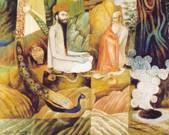|
|
 |
 |
 |
|
 |
 |
Sistemas, tem a finalidade de contribuir para a divulgação das linhas de pensamento dentro das várias Religiões e Filosofias de todo o mundo, na compreensão de que todas partilham afinal uma linguagem comum.
|
|
|
Considering the great percentage of visitors coming from all countries in the world, we consider of importance that some texts should be in English.
Tendo em conta a grande percentagem de visitas originárias de todos os países do mundo, consideramos importante haver artigos na língua inglesa.
|
|
|
|
page 1 of 4
Vedanta - Avasthatraya
by Y. Subrahmanya Sarma
in 14 Sep 2006
 All the Vedic schools agree that the System of Vedānta, as found in the principal Upaniṣads and elaborated by Badarayana in his famous Sūtras, attaches great importance to the examination of the three Avasthas or conditions of life called, Waking, Dream, and Dreamless Sleep. All the Vedic schools agree that the System of Vedānta, as found in the principal Upaniṣads and elaborated by Badarayana in his famous Sūtras, attaches great importance to the examination of the three Avasthas or conditions of life called, Waking, Dream, and Dreamless Sleep.
 Avasthatraya Avasthatraya
or
The Unique Method of Vedānta
All the Vedic schools agree that the System of Vedānta, as found in the principal Upaniṣads (§) and elaborated by Badarayana in his famous Sūtras, attaches great importance to the examination of the three Avasthas or conditions of life called, Waking, Dream, and Dreamless Sleep. There is divergence of opinion, however, regarding the purpose which this examination is intended to serve in the system. With profound respect to all Āchāryas, who no doubt have equal claim on us, as having ministered to the needs of countless souls, I propose to show in these pages what a veritable magician's wand this method of enquiry has been proved in the hands of that matchless thinker, Śri Śankarāchārya; for where all the other commentators saw no more than a confirmation of man’s inherent weakness and helplessness as justifying his eternal dependence on a scripture-revealed God by whose grace alone he could hope to attain a post mortem salvation, this great apostle of Vedic Monism alone envisioned the most comprehensive method devisable to demonstrate scientifically, the essential identity of the human soul with Brahman or Absolute Existence, Consciousness and Bliss.
It is neither possible nor desirable that chapter and verse should be quoted for each and every one of the statements made here in order to convince the reader that Śaṅkara actually regarded the Avasthaic Method as possessing such paramount importance for Vedānta as has been indicated above. It will be enough to adduce two typical passages extracted from his Bhashya on the Mandukya Upaniṣad, with Gaudapada-karika - the smallest of the ten principal Upaniṣads, which exclusively treats of the Avasthas. A careful reader will not miss the significant remark with which Śaṅkara introduces the work:
“This is a summary of the essence of all Vedānta teaching”.
Again, in introducing the Avasthaic method as set forth by Gaudapada in his explanatory Karikas on Mandukya, the Āchārya observes:
“The views of different schools contradict one another and lead to Samsāra (transmigration) as engendering the evils of love and hate; hence they are all misconceived. Having shown this through their own arguments, it has been concluded that the Adwaita, free from the fourfold defects already mentioned as well as from the evils of love and hate, naturally conduces to peace and is, therefore, the only right view. And now this section is begun in order to set forth the peculiar method of this philosophy”. (IV- 87 to 90.)
It is of more practical interest to enquire about the special features of the method which render it impossible to be superseded or stultified by any other. In the first place, it is the only method which considers life in all its aspects. Waking, Dream and Sleep exhausts all independent manifestations of Reality and, as Śaṅkara observes, “there is nothing beyond these three to be known, for all the postulates of different schools are comprehended in these”.
And, in the second place, any metaphysical conclusion based on the co-ordination of experiences of the three Avasthas, cannot possibly be stultified for the simple reason that, while stultification can happen only in time, such a conclusion would take us to heights where time is conspicuous by its absence.
In explanation of the second statement made above, it will be useful to observe that sitting in judgment over the Avasthas really means taking an attitude of self-dissociation from and objectification of all phenomena whatsoever.
(... next)  |
top  |
|
 |
Copyright © 2004-2024, Fundação Maitreya ® Todos os direitos reservados.
Consulte os Termos de Utilização do Spiritus Site ®
|
|



